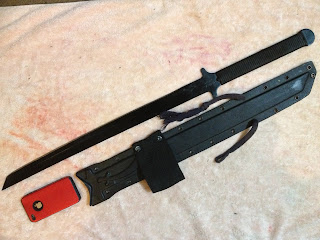 I came across a pretty good deal the other day on Catch Of The Day which I thought I would share with you here. I'm not usually one to buy into the "celebrity swag" but looking at the contents listed, I thought this would be a good investment, not only for my own collection, but also as a guide for what goes into a good "survival pack". I did Outdoor Ed whilst living in Canada, and I've kept a variety of packs going over the years. I've seen the Bear Grylls show, and some of the products that have been branded with his name, and whilst I may be skeptical of the contents of the show, I most certainly enjoy the extremes he is willing to go to to prove what one could do to survive. I also enjoyed seeing the swag of Gerber tools including Bear Grylls branded kit on AMC's "Walking Dead" but that isn't quite where we're up to yet. There is more to survival in a disaster than just hacking and chopping (as much fun as that may be). Other needs need to be met, and a kit like these can go a long way to seeing to those.
I came across a pretty good deal the other day on Catch Of The Day which I thought I would share with you here. I'm not usually one to buy into the "celebrity swag" but looking at the contents listed, I thought this would be a good investment, not only for my own collection, but also as a guide for what goes into a good "survival pack". I did Outdoor Ed whilst living in Canada, and I've kept a variety of packs going over the years. I've seen the Bear Grylls show, and some of the products that have been branded with his name, and whilst I may be skeptical of the contents of the show, I most certainly enjoy the extremes he is willing to go to to prove what one could do to survive. I also enjoyed seeing the swag of Gerber tools including Bear Grylls branded kit on AMC's "Walking Dead" but that isn't quite where we're up to yet. There is more to survival in a disaster than just hacking and chopping (as much fun as that may be). Other needs need to be met, and a kit like these can go a long way to seeing to those. Included in within the bright orange ripstop baggie is a second, waterproof bag and the following: a signalling whistle, always a good inclusion, as yelling is hard, and anyone can make a loud noise with a whistle. I have a three year old, and if she can effortlessly give an ear-splitting whistle with it, so can you, even if fatigued, injured or otherwise occupied. a packaged set of long beaded matches and a striker, good for getting a fire lit in less than ideal situations. A cotton ball, for kindling. Waxed twine, which has many uses, be it binding, mending or setting snares. The copper wire is just that, snare wire, not easily chewed by the poor unfortunate critter that will serve as an impromptu meal, but much hardier than just waxed twine, a length of nylon cordage which whilst not paracord, would serve in a variety of circumstances, and is light and bright. A Bear Grylls branded fire steel and bottle opener which is a great addition to any kit, as they are all-weather, very long lasting sources of of fire.
Included in within the bright orange ripstop baggie is a second, waterproof bag and the following: a signalling whistle, always a good inclusion, as yelling is hard, and anyone can make a loud noise with a whistle. I have a three year old, and if she can effortlessly give an ear-splitting whistle with it, so can you, even if fatigued, injured or otherwise occupied. a packaged set of long beaded matches and a striker, good for getting a fire lit in less than ideal situations. A cotton ball, for kindling. Waxed twine, which has many uses, be it binding, mending or setting snares. The copper wire is just that, snare wire, not easily chewed by the poor unfortunate critter that will serve as an impromptu meal, but much hardier than just waxed twine, a length of nylon cordage which whilst not paracord, would serve in a variety of circumstances, and is light and bright. A Bear Grylls branded fire steel and bottle opener which is a great addition to any kit, as they are all-weather, very long lasting sources of of fire.Also included is a very sweet little Gerber Paraframe-Mini blade, sporting a drop point, half serrations, a skeletonised handle and frame-lock. This hungry little knife makes an excellent addition to any survival kit, so much so that I tried to push it on my partner to be part of their EDC, but was admonished to leave the kit whole, as intended. The final part of the kit is a little booklet with Bear's how-to's. I haven't had a look yet, I'll leave it as a surprise for when disaster strikes.
I haven't decided where to keep this kit, but I'm glad I have it.
















